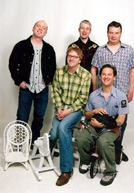




 |
 |
 |

Comment
on this story
What:
Cracker and Camper Van Beethoven Unplugged with Jason Isbell of Drive-By Truckers
When:
Tuesday, June 15, 8 p.m.
Where:
Blue Cats
Cost:
How much: $12 advance, $14 day of show
|
A Well-seasoned Lowery
The Cracker and Camper Van Beethoven bandleader rambles on
by Clint Casey
David Lowery has been making music professionally upwards of 20 years. In 1983, he formed the acoustic punk band Camper Van Beethoven, and, despite numerous personnel changes, developed a cult following, due in part to the success of the goofy, infectious pop anthem “Take the Skinheads Bowling.” Then in the early ‘90s, Lowery’s Camper bandmates abandoned him in favor of side project Monks of Doom, and in their absence, he founded Cracker, an alternative rock outfit that dominated radio airwaves with the pensive hits “Low,” “Teen Angst,” and “Get off This.”
Lowery reunited with a handful of his Camper cohorts after almost 10 years of estrangement in 1999 to compile a disc of rarities, and found himself gainfully employed by both Camper Van Beethoven and Cracker. With a new album on the horizon for Camper, Lowery is in the midst of an acoustic tour, playing favorites new and old for his legion of fans.
The upcoming Blue Cats performance on June 15 will feature Lowery with Johnny Hickman from Cracker and Jonathan Segel from Camper Van Beethoven. “It’s just the three of us playing some Cracker and some Camper songs together for about 70 minutes. Kind of an indie-rock, VH-1 Storytellers thing,” Lowery says. “We won’t be doing any ‘Layla’ acoustic guitar shuffles. We won’t be like the Eagles, sitting on stools, doing acoustic versions of ‘Hotel California.’ It’ll be a little closer to what we do electric, just because both bands are pretty rootsy and have acoustic instruments anyway.”
Armed with some songs more than 20 years old, Lowery is candid about the novelty of certain songs and breathing new life into them, with several holding a meaning different than they once did. “There was a point when a song like ‘Take the Skinheads Bowling’ or ‘Pictures of Matchstick Men’ had the potential to make Camper seem like a novelty band. But in today’s climate, they’re frickin’ bizarre compared to what everybody else is doing,” Lowery says. “History has been kind to those songs. And for a lot of other songs, the meaning or way that the audience interprets them is very different now than when they were college radio hits.”
Case in point: When Michael Moore needed a song for Bowling for Columbine, he called Lowery on his cell phone and asked permission to use “Take the Skinheads Bowling” in its opening segment. “We had met before a Cracker show at the Sundance Film Festival, and he knew that we were fans of his stuff. The song plays over the beginning, where he opens a bank account and buys a gun, and there’s a montage, but he didn’t show us more than that before we agreed to do it,” Lowery says.
The current tour and integration of Cracker and Camper Van Beethoven has given Lowery the opportunity to look back on his career and look forward to a future with both bands. “As far as being retrospective, everybody is still working and writing. There’s a new Camper Van Beethoven record that comes out in September of all new stuff that we’ve been working on for the last few years,” Lowery says. “It is retrospective in a way, but it’s still very much live bands. It’s very much bands that are still playing together, and I hope doing things that are seemingly vital and important to indie rock, post-punk, acoustic rock, alt country, whatever our music is.”
Because of the inability to pigeonhole Lowery’s music, his bands have been grouped into numerous genres. “Over the years, Camper was referred to as an acoustic punk band originally because we came out of the West Coast hard-core scene. We were embraced by the West Coast bible of hard-core punk rock “Maximum Rock ‘n’ Roll” as a punk band, but we quickly then were called a college rock band. Then an indie rock band, then Cracker became alternative rock, and then roots rock and alt country, and all these other ways of describing the band over the years,” Lowery says. “I think the fact that so many labels have been applied to us is good. We’ve survived, and people care enough to put us into one scene or another. It’s great that people struggle over us enough to explain it to other people.”

June 10, 2004 • Vol. 14, No. 24
© 2004 Metro Pulse
|
|